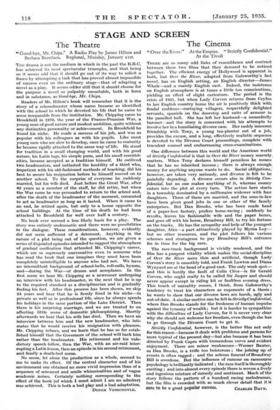STAGE AND SCREEN The Theatre
Good-bye, Mr. Chips." A Radio Play by James Hilton and • Barbara Burnham. Regional, Monday, January Zia.
TUE drama is not the medium in which in the past the B.B.C. has achieved its most spectacular triumphs, and that being so it seems odd that it should go out of its way to solicit a fiasco by attempting a task that has proved almost impossible of success even on the ordinary stage—that of adapting a novel as a play. It seems odder still that it should choose for the purpose a novel so palpably unsuitable, both in form and in substance, as Good-bye, Mr. Chips.
Readers of Mr. Hilton's book will remember that it is the story of a sch000lmaster whose name became so identified with the school to which he devoted his life that he came to seem inseparable from the institution. Mr. Chipping came to Brookfield in 1870, the year of the Franco-Prussian War, a young man of good nature and modest ambition, quite without any distinctive personality or achievement. In Brookfield he found his niche. He made a success of his job, and was as popular with his colleagues as with his pupils. Like most young men who are slow to develop, once he came to maturity he became rigidly attached to the same way of life. He stood for tradition in a small changing world, and with his good nature, his Latin tags, his simple puns, and his small eccentri- cities, became accepted as a tradition himself. He outlived two headmasters, and outlasted the hostility of a third who, impatient with his old-fashioned methods of teaching, did his best to secure his resignation before he himself moved on to another school. To the surprise of everyone he suddenly married, but his wife died. Just before the Great War, after 42 years as a member of the staff, he did retire, but when the War came he was persuaded to return to the school and, after the death of the headmaster of the moment, consented to act as headmaster as long as it lasted. When it came to an end, he retired again, but only to a house opposite the school buildings. At the time of his death he had been attached to Brookfield for well over half a century.
No book ever seemed a less likely basis for a play. The story was entirely undramatic and there were no possibilities in the dialogue. These considerations, however, evidently did not seem sufficient of a deterrent. Anything in the nature of a plot being out of the question, we are given a series of disjointed episodes intended to suggest the atmosphere of gradual ossification that attended Mr. Chipping's career, which are so supremely unevocative even to someone who has read the book that one imagines they must have been completely unintelligible to anyone who had not. We have an intermittent background of school-bells, roll-calls, hymns, and—during the War—of drums and aeroplanes. In the first scene we hear Mr. Chipping as a newcomer undergoing an interview with his headmaster, in the next that he is up to the required standard as a disciplinarian and is gradually finding his feet. After this process has been shown, we skip 24 years and hear that he is firmly fixed in his niche—in private as well as in professional life, since he always spends his holidays in the same portion of the Lake District. Then there is his surprising marriage, and we are treated to an affecting little scene of domestic philosophizing. Shortly afterwards we hear that his wife has died. Then we have an interview between him and the new headmaster, who inti- mates that he would receive his resignation with pleasure. Mr. Chipping refuses, and we learn that he has so far estab- lished himself that the Governors of the school will back him rather than the headmaster. His retirement and his vale- dictory speech follow, then the War, with an air-raid inter- rupting a Latin lesson, then an episode in his second retirement, and finally a death-bed scene.
No scene, let alone the production as a whole, seemed to
me to make its effect. Of the central character and of his environment one obtained no more vivid impression than of a sequence of senescent and senile whimsicalities and of vague academic noises. Certainly nothing corresponding to the effect of the book (of which I must admit I am no admirer) was achieved. This is both a bad play and a bad adaptation.
DEREK VERSCHOYLF..














































 Previous page
Previous page